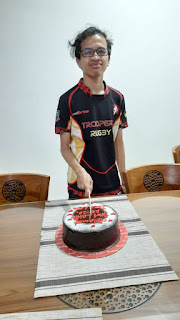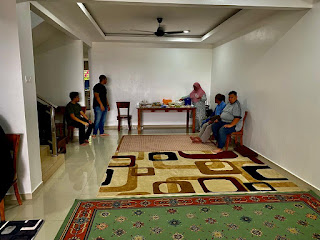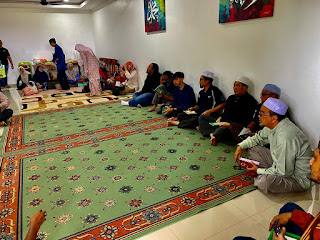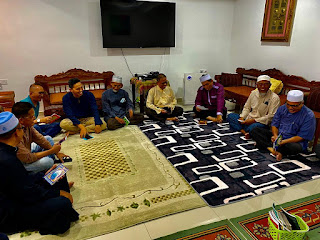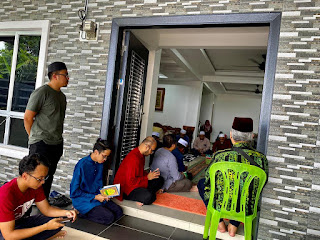Thought I do one last post before leaving for umrah. Been wanting to do this post for a long time but hesitated, particularly I wanted to finish my rereading of Ihya Ulumiddin first volume (Indonesian translation), which I have not done.
Now, each of us often feel that we are 'special' (particularly in academia) and that our field of expertise should be given special consideration. Sincerely, this is just an attempt of self-worth assertion in the hypercomplex hierarchy of worthiness. In a world full of competition, there is a tendency to linearise this worthiness in a one-dimensional scale where full ordering can be put in place. As such, unnatural comparisons begin to take place and worse, if (office) politics become a factor. Here, the leader of the organization really need to show his wisdom, so that the organization, while holding to some forms of hierarchy, they are not used for injustices but for promoting growth and progress. Given this complexity, I do tend to evaluate my own self on many areas but for today, I will limit myself to scientific front as understood by many. I consider myself as an average theoretical physicist, not a 'star player' as some would want us to be, but yet not one of mediocrity or foolishness. Having said this, one needs to give this a historical context.
I come from an average Malay family and the atmosphere that we grew in, is one that has so many racial stereotypes. The psyche that we had when I was young, is that we were never good enough to excel in areas that are particularly technical. I remembered a story told by my late mum, during someone's pilgrimage journey that someone mentioned that it is rare for Malays to take up difficult course like theoretical physics. But there I was, accidentally caught in the world of theoretical physics. Like what I have told a student of mine, rather than being an 'example', I tend to see myself as a 'counterexample'. In the Muslim psyche, would like to consider it to be a fard-kifayah.
At school, I was never the top student but I still did relatively well. I think I was a student that listens attentively in class; other students seemed to see me not having to stay up too much to study, sleeping early in most days. I do have a sense of competitiveness but it seems I never want to go to extremes. I still remember that one teacher even told me not to imagine I'm that clever, perhaps alluding to the stereotype I have mentioned earlier. Below is a pic of me in a Mathematics Society - I tend to blend in the background, never the prominent one, being an introvert.

At school, because of the limited competition, I think I still held on to the aforementioned stereotype. Things changed a little as I go abroad for my studies, where competition has broadened to an international setting. I saw I could compete with others (again I'm not the brightest) and there will be a spread of talent in any community. One that I realised pretty quickly is that all one needs are opportunities and the right environment. When I fell in love with theoretical physics, my thoughts were why I wasn't introduced to these subjects earlier (or at least heard of them). It was only in my third year undergraduate in Adelaide, that I got my first glimpse of theoretical physics.
Having gotten a First Class Honours, my confidence grew and I thought I was good. It was
Part III of Mathematical Tripos in
DAMTP, Cambridge University that made me realise how wrong I was. There were so many more talented people coming from all over the world. I was the only Asian in the class and I was rather an average student then (will retell the story in another post, God willing). I struggled in Part III, but I got through (I knew some who failed). However, I didn't get the PhD offer in DAMTP though there was a verbal offer to do PhD in Cavendish Laboratory on condensed matter. Here is a pic of me in Darwin College, packing my things to move to Durham for my PhD.

With self-confidence wrecked, I tend to consider my PhD as average as well. To be honest, there was one part of my PhD research that was not quite completed and it involves very technical ideas of representations of loop group. At the time, I had to go back home as my scholarship has ended and my father was hospitalised (I did not know at the time). As soon as my flight reached KL, I was rushed to the hospital to see my father. The next day, he left us. As I reported for duty in UPM, I was told that I had to go to Bintulu Campus. These are during the hard days when there was no internet access and no mobile phone besides
ATUR. If I called home, I need to use the public phone. Not much could be done there, I was only teaching diploma level courses.
Three semesters after, I got back into the main campus and started to reinitiate my research. I pushed for theoretical physics agenda. Theoretical physics, for some reason, was identified with high energy physics and there was little encouragement. Not many understood the brand of theoretical physics I was pursuing could be in many different domains of physics. I took up supervision of BSc final year projects and had to teach a lot since their background knowledge seems lacking. Lowering oneself at a basic level, did not help me with my research capabilities. I began taking more postgraduate students and get the courage to build up a theoretical physics group. At the time I started something on quantization on punctured surfaces. Most research in this area seems to be in pure mathematics with less physical orientation. It was indeed a struggle but we (with the students) went on to find research problems we can handle. Quantum information then, was relatively new. I only started thinking about it when I joined ITMA but mainly from quantum foundations point of view (trying to integrate with the institute whose aims are to develop advanced technology). Later, I was told to move to INSPEM (maths institute) - while I continued with the quantum information agenda, I thought I should integrate with the main aims of the maths institute. I explored other areas, like complex networks, but all of the things I have started stems from a geometric approach. As I got to be more involved in administration, I thought it was good to have a real balance between the theoretical side of mathematics and the applied side. I was banking on expanding the purer side as the community is smaller in Malaysia, However, some interpret the small community was a sign of weakness and that large numbers reflect strength. I had different ideas; it should be more on international respectability. Did many different programs of international nature including EQuaLS. I realised that some may interpret this as activities that only strengthen my interest. Here are some pics that are not from EQuaLS programme and they need not necessarily fit my research interests.
With Institute of Mathematics, Hanoi.
With Chern Institute, Tianjin, China.
With CQT and SpeQtral, Singapore
With Polito and MICEMS
It was an honour for me to pursue all of these, though personally, I wished that they were more successful and be considered more seriously by the management. Parts of these efforts are indeed my dreams to make theoretical physics and generally more technical mathematical sciences more commonly acceptable in our local Malaysian scientific ecosystem.
Today, the struggle is still there. We are still relatively small in numbers in terms of theoretical physics and pure mathematics. Even as I retire, I strongly believe that these technical areas should be strongly pursued by Malaysians so that our science is stronger. The belief that theoretical areas should not be our main concern is still being held by many as shown in this letter (parts blotted out).
Perhaps it is true what my ex-student has said, we have still a long way to go in developing strong theoretical sciences in the country.
So what is left for me to do? I read from one social media post that old folks like me, will eventually be forgotten. God willing, I will still try to push for theoretical sciences agenda but perhaps not in a setting what I have done before. Perhaps I will know more when I come back from umrah. May Allah help us.












